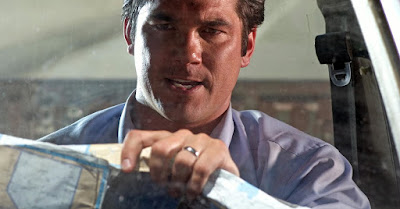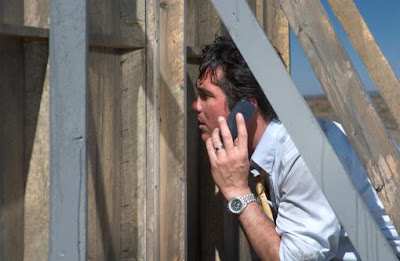Be careful which way you turn.
It's always a pleasant surprise when you pop in a DVD of an unknown film that you expect to suck and it doesn't. In the case of Lost, we would even say the low-budget independent thriller is surprisingly good, though it does noticeably lose its way towards the end.
Which doesn't mean that it ends as a disappointment: you might be able to see the ending coming, but you cannot but help be pleased that screenwriter and first (and so far only) time director Daren Lemke wasn't afraid of irony, nor of being consequent. Or at least he wasn't when he made Lost 19 years ago: a successful Hollywood screenwriter by now, Lemke's bigger and big-budget credits might range from enjoyable (Shazam! [2019 / trailer]) to mildly enjoyable (Goosebumps [2015 / trailer]) to absolute drivel (Gemini Man [2019 / trailer]), but other than maybe Shazam! they pretty much all lack either irony or consequence.
Full film in German:
What is also pleasantly surprising about Lost is that the virtual one-man show conducted by Dean Cain, an actor that is truly hard not to dislike,* is well-executed and for the most part believable. One might be tempted to simply write off Cain's decent thespian turn as being above all due to the fact that the innately dislikeable actor is playing an innately dislikeable character, but to reduce his performance simply to that completely ignores the fact that more than once during the movie Cain actually manages to make the viewer sympathize with the self-entitled yuppie jerk and, by the movie's resolution, almost feel sorry for him.
* Cain normally looks like a youngified, bloated and supercilious William Shatner but lacks the innate sense of burlesque that makes that elder tub of lard palatable, if but barely. That said, with the right agent Cain could possibly well end up, like Shelley Winters (18 Aug 1920 – 14 Jan 2006), to have a long career as a character actor.
The title Lost plays upon two aspects of the film. The first, and initially lesser obvious aspect, especially at the start of the movie, is that the lead character, banker Jeremy Stanton (Dean Cain), has lost his way in life. ("Be careful which way you turn" is metaphysical here.) A manager of some Californian bank, he is first seen taking some news badly, and then we see him lost on the back roads of Nevada, where neither his map nor his subscriber telephone directional service is of any help to him. Bit by bit, between choleric fits and wrong turns, the reason for his trip is revealed: a self-entitled man who feels slighted, he took what might be called a U-turn in life and must now reach a plane to meet-up with his wife and kid in Mexico.
Unluckily, more than just his drive doesn't go exactly as planned, and before long he has a vengeful, cold-blooded bank robber and killer (Danny Trejo of Anaconda [1997], From Dusk Till Dawn 3: The Hangman's Daughter [1999], Seven Mummies [2006], Planet Terror [2007], Rise of the Zombies [2012] and so much more) not just on his trail, but having fun with the chase. And thus, the former upright banker, whose desire to have that which he feels is owed to him has led him to lose his straight-and-narrow way of life, is desperately driving roads unknown and unfamiliar to reach a location and future that he can't find, with only the unnaturally excellent mobile phone reception to help him...
What sounds like a boring set-up — some dude lost for 1.5 hours: how exciting can that be? — is actually an involving film with moments of deadpan humor, tense suspense, and even Kafka-tinged existentialism (sometimes, life just doesn't deal a good hand). Banker Stanton becomes more human over the course of the film, despite his initial assholism and the multitude of stupid things he does along the way, which helps make the ending hit all the harder — even if the ending does sort of announce itself in advance the minute Judy (Ashley Scott of Trespassing [2004]), the friendly voice on the telephone, suddenly becomes unnaturally helpful. Trejo, as the violent and (for most of the film) faceless robber Edward Archer, also deserves his kudos: even if one doesn't know who he is or how he looks behind the mask he's usually wearing when he is shown in full, he parlays a lot of threat and danger into both his character's voice and manner, giving the stock character a palatable aura of menace.
Judy in Lost —
you never see her:
In regards to the narrative, aside from the flashes of dry humor, it is the structure of the first half of Lost that makes the movie so involving: the narrative reveals important plot elements in fits and dollops, so you only learn the background story behind things bit by bit, which plays with and twists our expectations as a viewer. Once all the cards are on the table, things do get a bit more predictable, but never less interesting.
Don't be mistaken: Lost is not some unknown masterpiece. It is simply a well-made if somewhat flawed independent thriller that manages to make its simple concept an enjoyable and gripping ride. Likewise, the cast does an excellent job. Combined, that alone makes Lost waaaay better than most of the bigger-budgeted crap that gets a big release and a ton of press. Definitely worth searching out if obscure, decently made low-budget movies are your thing — or if you simply like a good crime thriller. Lost is truly a film that does not deserve to be lost to obscurity








No comments:
Post a Comment